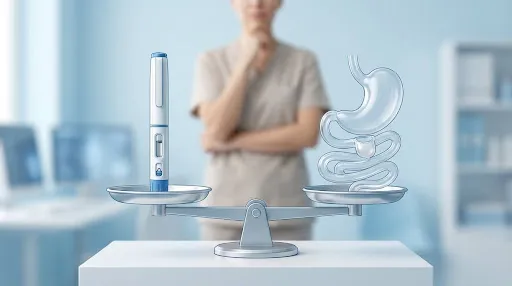|
Dicyclomine reduces gut spasms tied to IBS. Some notice reduced anxiety when pain calms, though it’s not an official anxiety treatment. Relief comes fast but may trigger restlessness or insomnia. |
Anxiety doesn’t just stay in the mind; it often hits the gut, too. Many people who struggle with anxiety also experience stomach cramps, bloating, or IBS-like discomfort. That’s where Dicyclomine, a medication primarily prescribed for irritable bowel syndrome (IBS), enters the picture. Interestingly, some people report it easing not just gut spasms, but their anxiety symptoms too. So, can Dicyclomine be used for anxiety? Let’s find out what science says.
Is Dicyclomine Used for Anxiety?
No, Dicyclomine (Bentyl) is not FDA-approved for anxiety treatment. There is no scientific evidence that reports its role in treating anxiety. It is only approved to treat Irritable Bowel Syndrome (IBS) symptoms, such as pain and muscle spasms. But as it helps relieve pain and cramps, this medicine can indirectly help treat anxiety symptoms by reducing stress related to severe gastrointestinal disorders.
In some cases, it can worsen anxiety by causing side effects, such as extreme anxiety, insomnia, agitation, or confusion. If you experience worsening anxiety or new symptoms after starting Dicyclomine treatment, consult your healthcare provider.
But then, why is Dicyclomine Used for Anxiety?
Dicyclomine is officially approved for treating IBS-related pain and spasms. Doctors typically prescribe it when patients struggle with twisting or tightening sensations in their gut. Still, because the gut and mind are closely connected, people often notice changes in their emotional state once their stomach calms.
Though not a preferred medication for anxiety, Dicyclomine may provide indirect relief from some physical symptoms that mimic or worsen anxiety. These symptoms include:
-
Abdominal cramps
-
Nausea
-
Digestive discomfort
-
Irritable bowel symptoms
These symptoms often overlap with anxiety, especially in people with gastrointestinal issues, such as a nervous stomach caused by anxiety or IBS triggered by stress. In such cases, the medicine may ease physical discomfort, which in turn can reduce feelings of anxiety.
That doesn’t make Dicyclomine a direct treatment for anxiety, but it does explain why the discussion exists. IBS itself is frequently linked with anxiety: when stomach pain appears, stress follows and that stress, in turn, worsens the pain. This feedback loop convinces some that easing one side may soften the other.
A 2024 review highlighted that while antispasmodics like Dicyclomine can reduce abdominal spasms, the overall evidence quality remains low, as most studies are older and have design flaws. This means the benefits aren’t as strong on paper as they seem in patient experiences.
Does Dicyclomine Really Help With Anxiety?
It depends on how you define “help.”
Dicyclomine relaxes intestinal muscles by blocking acetylcholine. That chemical messenger triggers contractions that push food forward. Reduce those contractions, and pain eases. Less pain equals fewer panic moments for some. So yes, for IBS-related worry, dicyclomine for anxiety can provide a small break.
But the drug does not touch the core brain pathways responsible for panic or constant worrying. It is not a traditional dicyclomine anxiety medication.
And there’s another wrinkle: can dicyclomine cause anxiety? Yes, it can. Nervousness, agitation, and even episodes that feel like dicyclomine anxiety panic attacks appear in reports. That’s why the experience can swing either way.
Points to weigh
-
Direct effect on anxiety: no.
-
Indirect effect: possible through easing IBS pain.
-
Onset: works within 60–90 minutes.
-
Duration: short, about 6 hours.
Benefits of Dicyclomine When Used for Anxiety
Some patients swear it helps them function on days when IBS feels impossible. The benefits aren’t magic, but for certain moments they’re real.
1. Relief from spasms
By blocking acetylcholine, dicyclomine cuts down painful contractions. This effect matters most for people who link abdominal cramping with sudden spikes of worry.
2. Indirect anxiety reduction
When the body isn’t twisting in pain, the nervous system can breathe easier. This is why some talk about dicyclomine anxiety relief, even though it’s not a standard therapy.
3. Fast onset for flare-ups
Unlike therapies that take weeks to build up, dicyclomine acts fast. Many notice relief within an hour. For a person juggling both IBS and stress, that window matters.
4. Affordable access
As a generic, it costs less than many gut-directed therapies. When health costs pile up, affordability plays its own role in lowering stress.
5. Practical example
Imagine a business traveler heading to a client meeting. The stomach cramps start on the taxi ride. Taking dicyclomine may calm the spasms before stepping into the boardroom. That short window of calm can feel like control regained.
Who Might Benefit from Dicyclomine?
This medication is considered off-label in people who:
-
experience IBS or gastrointestinal symptoms that become worse with anxiety.
-
have anxiety-associated abdominal pain or cramps
-
Can't tolerate other first-line treatment options for GI or any anti-anxiety medications
Note: Use Dicyclomine only under a doctor's guidance. Do not take it as a replacement for standard anti-anxiety medications or professional treatment for mental health.
Risks of Using Dicyclomine for Anxiety
Every upside has its other side. For dicyclomine, the risks are not small.
1. Short coverage
Its effect fades after 6 hours. Missing a dose may mean symptoms and the stress tied to them return quickly. For some, that schedule itself feels like a burden.
2. Nervous system reactions
Some people find their anxiety gets worse. Reports of insomnia, jitteriness, or racing thoughts show why dicyclomine side effects anxiety can’t be ignored.
3. Evidence questions
A 2024 PMC review covering pharmacologic IBS treatments pointed out that while antispasmodics like dicyclomine can reduce abdominal spasms, the overall evidence quality is low, based on older studies with design flaws. That means the benefits aren’t as strong on paper as in patient stories.
4. Age and health conditions
Older adults are more prone to confusion and dizziness. People with glaucoma, enlarged prostate, or heart rhythm problems face higher risks. For them, the downsides outweigh the relief.
Side Effects of Dicyclomine Used for Anxiety
Like most medications, Dicyclomine can cause side effects. Some are mild and short-lived, while others need quick medical attention.
1. Common side effects
These are mostly related to its anticholinergic effects:
-
Dry mouth
-
Constipation or bloating
-
Drowsiness or dizziness
-
Blurred vision
-
Nausea
-
Difficulty urinating
-
Nervousness or jittery feelings
These may fade as the medicine wears off — Dicyclomine typically leaves the body within about 6 hours.
2. Rare but serious side effects
Seek medical help right away if you notice:
-
Confusion or agitation
-
Hallucinations
-
Trouble speaking, swallowing, or urinating
-
Sensitivity to light or dilated pupils
-
Changes in heart rhythm or heartbeat
Though not everyone experiences these, it’s important to track how you feel — especially if you’re taking Dicyclomine for IBS and already prone to anxiety.
Who Should Not Use Dicyclomine for Anxiety?
Not everyone is a candidate for this medication. Certain health conditions make its use risky or unsafe.
Avoid Dicyclomine if you have:
-
Glaucoma
-
Myasthenia gravis (a condition causing muscle weakness)
-
Severe ulcerative colitis
-
Prostate enlargement or urinary retention
-
Reflux esophagitis (esophageal inflammation)
-
A blockage in the gut or urinary tract
Special precautions:
-
Infants under 6 months should never be given Dicyclomine due to risks of breathing problems, seizures, and even death.
-
Pregnant or breastfeeding individuals should avoid it to prevent possible harm to the baby.
The list isn’t short and it highlights why Dicyclomine should never be self-started without medical supervision.
Dicyclomine vs. Standard Anxiety Treatments
| Medication | Primary Use | Used for Anxiety? | Acts on the Brain? |
|---|---|---|---|
| Dicyclomine | IBS pain and spasms | Not approved | No — acts on gut muscles |
| SSRIs (e.g., Sertraline) | Depression and anxiety | ✅ First-line treatment | Yes |
| Benzodiazepines (e.g., Lorazepam) | Anxiety, panic, muscle relaxation | ✅ Short-term use only | Yes |
| Buspirone | Generalized anxiety disorder | ✅ Approved use | Yes |
In short: Dicyclomine doesn’t act on the brain or emotional centers that drive anxiety, it mainly relaxes the gut. While this may ease some anxiety-related stomach discomfort, it isn’t an actual anxiety medication.
Safer and More Effective Alternatives to Dicyclomine for Anxiety
If your goal is long-term anxiety relief, there are safer and more targeted approaches that calm both the mind and body, without the same side-effect risks.
-
Cognitive Behavioral Therapy (CBT): Helps identify and break anxiety-triggering thought patterns.
-
Approved anxiety medications (SSRIs, SNRIs, Buspirone): Scientifically proven to balance brain chemistry linked with anxiety.
-
Mindfulness and meditation: Train the mind to reduce overthinking and physical stress responses.
-
Regular aerobic exercise: Improves mood-regulating neurotransmitters and reduces tension.
-
Addressing IBS triggers through diet: Reduces gut flare-ups that can worsen anxiety symptoms.
-
Gut-directed hypnotherapy: Targets the brain–gut connection directly for IBS-related anxiety.
-
Relaxation and breathing techniques: Activate the body’s natural calming response.
Each of these options addresses the emotional and physiological roots of anxiety, rather than hoping relief will come indirectly through gut relaxation alone.
When to See a Doctor for Anxiety?
Consult a healthcare provider if you experience:
-
Persistent anxiety that interferes with your daily life
-
Panic attacks
-
Avoidance of social events or situations
-
Physical symptoms, such as a rapid heartbeat or sweating
-
Sleep disturbances
-
Depression
-
Suicidal thoughts
Seeing a doctor can help with more effective options for anxiety.
Final Thoughts
So, is dicyclomine used for anxiety? Technically, no, but indirectly yes for some. It calms gut spasms, and that can ease stress tied to IBS flares. Still, it isn’t a direct anxiety drug. And for some, the side effects, including dicyclomine anxiety reactions, outweigh the gains.
The smarter move is often to pair gut care with proven mental health strategies. Dicyclomine might help in specific moments, but it’s rarely the whole answer.
DISCLAIMER: This content is intended for educational and informational purposes only. It doesn't comprise medical advice. Always consult a qualified medical professional before taking any medicine for anxiety.
Frequently Asked Questions
What are some common dicyclomine 10 mg capsule side effects?
Common side effects include dry mouth, dizziness, blurred vision, nausea, and difficulty urinating. It's important to monitor these side effects and discuss them with your doctor.
What is the drug dicyclomine 20 mg used for?
Dicyclomine 20 mg is primarily used to treat symptoms of irritable bowel syndrome IBS, such as stomach spasms and cramps. It works by relaxing the muscles in the gut.
Can dicyclomine be used to treat conditions other than gastrointestinal issues?
While primarily prescribed for IBS, some off-label uses of dicyclomine, including for anxiety related to gastrointestinal discomfort, have been explored. However, always consult a doctor before using it for off-label purposes.
How long does it take for dicyclomine to start working?
Dicyclomine typically starts to work within an hour of ingestion, providing quick relief from muscle spasms and associated symptoms in the gastrointestinal tract.
What is dicyclomine hydrochloride used for?
Dicyclomine hydrochloride is used to treat a range of gastrointestinal conditions, particularly for relieving muscle spasms in the stomach and intestines. Its main application is in managing IBS symptoms.
Is dicyclomine anxiety relief reliable?
Not for everyone. It helps gut spasms, which may ease anxiety indirectly, but direct relief is inconsistent.
Can dicyclomine cause anxiety or panic attacks?
Yes. Nervousness, restlessness, and even panic-like episodes appear in some people.
Does dicyclomine help with anxiety long-term?
Unlikely. Its short effect window makes it more suited for temporary symptom relief.
Is dicyclomine safe for elderly people with anxiety?
Usually not. The risk of confusion and falls makes it unsafe for older adults.
What’s better than dicyclomine for stress and anxiety?
Therapy, approved anxiety medicines, and lifestyle strategies provide more reliable relief.
-User-1754380331.png)
Reviewed by







